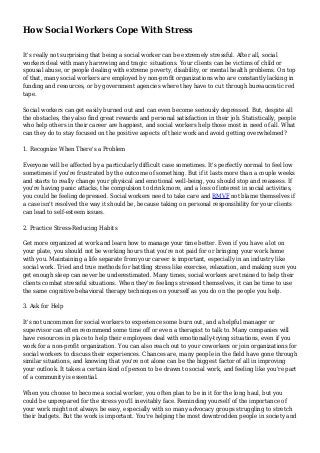
How Social Workers Cope With Stress
- 1. How Social Workers Cope With Stress It's really not surprising that being a social worker can be extremely stressful. After all, social workers deal with many harrowing and tragic situations. Your clients can be victims of child or spousal abuse, or people dealing with extreme poverty, disability, or mental health problems. On top of that, many social workers are employed by non-profit organizations who are constantly lacking in funding and resources, or by government agencies where they have to cut through bureaucratic red tape. Social workers can get easily burned out and can even become seriously depressed. But, despite all the obstacles, they also find great rewards and personal satisfaction in their job. Statistically, people who help others in their career are happiest, and social workers help those most in need of all. What can they do to stay focused on the positive aspects of their work and avoid getting overwhelmed? 1. Recognize When There's a Problem Everyone will be affected by a particularly difficult case sometimes. It's perfectly normal to feel low sometimes if you're frustrated by the outcome of something. But if it lasts more than a couple weeks and starts to really change your physical and emotional well-being, you should stop and reassess. If you're having panic attacks, the compulsion to drink more, and a loss of interest in social activities, you could be feeling depressed. Social workers need to take care and RMVF not blame themselves if a case isn't resolved the way it should be, because taking on personal responsibility for your clients can lead to self-esteem issues. 2. Practice Stress-Reducing Habits Get more organized at work and learn how to manage your time better. Even if you have a lot on your plate, you should not be working hours that you're not paid for or bringing your work home with you. Maintaining a life separate from your career is important, especially in an industry like social work. Tried and true methods for battling stress like exercise, relaxation, and making sure you get enough sleep can never be underestimated. Many times, social workers are trained to help their clients combat stressful situations. When they're feelings stressed themselves, it can be time to use the same cognitive behavioral therapy techniques on yourself as you do on the people you help. 3. Ask for Help It's not uncommon for social workers to experience some burn out, and a helpful manager or supervisor can often recommend some time off or even a therapist to talk to. Many companies will have resources in place to help their employees deal with emotionally-trying situations, even if you work for a non-profit organization. You can also reach out to your coworkers or join organizations for social workers to discuss their experiences. Chances are, many people in the field have gone through similar situations, and knowing that you're not alone can be the biggest factor of all in improving your outlook. It takes a certain kind of person to be drawn to social work, and feeling like you're part of a community is essential. When you choose to become a social worker, you often plan to be in it for the long haul, but you could be unprepared for the stress you'll inevitably face. Reminding yourself of the importance of your work might not always be easy, especially with so many advocacy groups struggling to stretch their budgets. But the work is important. You're helping the most downtrodden people in society and
- 2. giving them hope for the future. Nobody said it would be easy, but it's the best reason to go into the office you'll ever find. http://warren4321.hubpages.com/hub/How-Social-Workers-Cope-With-Stress